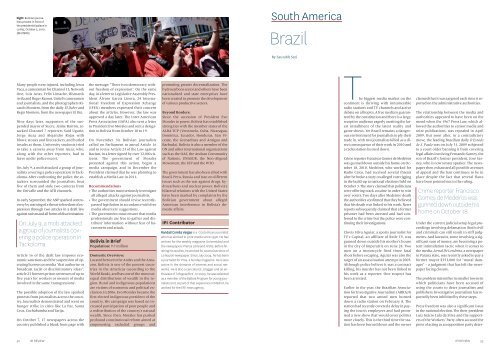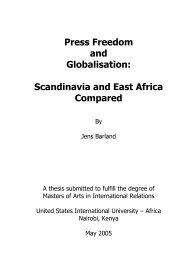FOCUS ON THE AMERICAS - International Press Institute
FOCUS ON THE AMERICAS - International Press Institute
FOCUS ON THE AMERICAS - International Press Institute
Create successful ePaper yourself
Turn your PDF publications into a flip-book with our unique Google optimized e-Paper software.
Right: Bolivian journalists<br />
protest in front of<br />
the presidential palace in<br />
La Paz, October 5, 2010.<br />
(REUTERS)<br />
Many people were injured, including Jesus<br />
Vaca, a cameraman for Channel 13, Network<br />
One, Luis Arias, Felix Limache, Bismarck<br />
Avila and Roger Ramos, Unitel’s cameramen<br />
and journalists, and the photographers Ricardo<br />
Montero, from the daily El Deber and<br />
Regis Montero, from the newspaper El Día.<br />
Nine days later, supporters of the suspended<br />
mayor of Sucre, Jaime Barrón, attacked<br />
Channel 7 reporters Saíd Ugarte,<br />
Jorge Auza and Alejandro Rojas with<br />
blows, stones and firecrackers, and hurled<br />
insults at them. University students tried<br />
to take a camera away from Auza, who,<br />
along with the other reporters, had to<br />
leave under police escort.<br />
On July 9, a mob attacked a group of journalists<br />
covering a police operation in Tackoloma.<br />
After confronting the police, the attackers<br />
surrounded the journalists, beat<br />
five of them and stole two cameras from<br />
the Univalle and the ATB channels.<br />
In early September, the ANP sparked controversy<br />
by warning of a threat to freedom of expression<br />
through two articles in a draft law<br />
against racism and all forms of discrimination.<br />
On July 9, a mob attacked<br />
a group of journalists covering<br />
a police operation in<br />
Tackoloma.<br />
Article 16 of the draft law imposes economic<br />
sanctions and the suspension of operating<br />
licenses on media “that authorize or<br />
broadcast racist or discriminatory ideas”;<br />
article 23 foresees prison sentences of up to<br />
five years for workers or owners of media<br />
involved in the same ‘transgressions’.<br />
The possible adoption of the law sparked<br />
protests from journalists across the country.<br />
Journalists demonstrated and went on<br />
hunger strike in cities like La Paz, Santa<br />
Cruz, Cochabamba and Tarija.<br />
On October 7, 17 newspapers across the<br />
country published a blank front page with<br />
52 IPI REVIEW<br />
the message: “There is no democracy without<br />
freedom of expression”. On the same<br />
day, in a letter to Legislative Assembly President<br />
Álvaro García Linera, 24 <strong>International</strong><br />
Freedom of Expression Xchange<br />
(IFEX) members expressed their concern<br />
about the articles. However, the law was<br />
approved a day later. The Inter American<br />
<strong>Press</strong> Association (IAPA) also sent a letter<br />
to President Evo Morales and sent a delegation<br />
to Bolivia from October 18 to 19.<br />
On November 30, Bolivian journalists<br />
called on Parliament to annul Article 16<br />
and to revise Article 23 of the Law against<br />
Racism, in a letter signed by over 32,000 citizens.<br />
The government of Morales<br />
protested against this action, began a<br />
media campaign, and in December the<br />
President claimed that he was planning to<br />
establish a Media Law in 2011.<br />
Recommendations<br />
• The authorities must seriously investigate<br />
all alleged attacks against journalists.<br />
• The government should revise recentlypassed<br />
legislation in accordance with free<br />
media observers’ suggestions.<br />
• The government must ensure that media<br />
professionals are free to gather and distribute<br />
information without fear of harassment<br />
and attack.<br />
Bolivia in Brief<br />
Population: 9.7 million<br />
Domestic Overview:<br />
Located between the Andes and the Amazon,<br />
Bolivia is one of the poorest countries<br />
in the Americas (according to the<br />
World Bank), and has one of the most unequal<br />
distributions of wealth in the region.<br />
Rural and indigenous populations<br />
are victims of economic and political exclusion.<br />
In 2006, Evo Morales became the<br />
first elected indigenous president of the<br />
country. His campaign was based on increased<br />
participation of poor people and<br />
a redistribution of the country’s natural<br />
wealth. Since then, Morales has pushed<br />
profound constitutional reform aimed at<br />
empowering excluded groups and<br />
promoting greater decentralization. The<br />
hydrocarbons sector and others have been<br />
nationalized and state enterprises have<br />
been created to promote the development<br />
of various productive sectors.<br />
Beyond Borders:<br />
Since the accession of President Evo<br />
Morales to power, Bolivia has established<br />
strong ties with the member states of the<br />
ALBA-TCP (Venezuela, Cuba, Nicaragua,<br />
Dominica, Ecuador, Honduras, San Vicente,<br />
the Grenadines and Antigua and<br />
Barbuda). Bolivia is also a member of the<br />
UN and other international organizations<br />
such as the OAS, the Andean Community<br />
of Nations, UNASUR, the Non-Aligned<br />
Movement, the UIP and the WTO.<br />
The government has also been allied with<br />
Brazil, Peru, Russia and Iran on different<br />
issues such as the war against drugs, hydrocarbons<br />
and nuclear power. Bolivia’s<br />
bilateral relations with the United States<br />
have been marked by complaints by the<br />
Bolivian government about alleged<br />
American interference in Bolivia’s domestic<br />
affairs.<br />
IPI Contributor<br />
Randall Corella Vargas is a Costa Rican journalist<br />
who has worked in print media since 1998. He has<br />
written for the weekly magazine Universidad and<br />
the newspapers Prensa Libre and Al Día. Before finishing<br />
his studies, he worked for several sections of<br />
La Nación newspaper. Since July 2004, he has been<br />
a journalist for Proa, a Sunday magazine. He is also<br />
active in the domains of Internet and social networks.<br />
He is also a caricaturist, blogger and an enthusiast<br />
of ‘infographics’. In 2009, he was selected<br />
as a member of the Balboa Program for young journalists<br />
and, as part of that experience in Madrid, he<br />
worked for the EFE news agency.<br />
South America<br />
Brazil<br />
By Saurabh Sati<br />
The biggest media market on the<br />
continent is thriving with innumerable<br />
radio stations and TV channels and active<br />
debate on all topics. A free media is guaranteed<br />
by the constitution and there is a large,<br />
receptive audience eagerly awaiting the latest<br />
installment of the latest reality and<br />
game shows. Yet Brazil remains a dangerous<br />
environment for journalists to ply their<br />
trade in, with two journalists killed as a direct<br />
consequence of their work in 2010 and<br />
a radio station burned down.<br />
Crime reporter Francisco Gomes de Medeiros<br />
was gunned down outside his home on October<br />
18, 2010. Medeiros, who worked for<br />
Radio Caico, had received several threats<br />
after he broke a story on alleged vote rigging<br />
in the build-up to national elections held on<br />
October 3. The story claimed that politicians<br />
were offering crack cocaine in order to win<br />
over voters. Two days after Medeiros’ death<br />
the authorities confirmed that they believed<br />
that his death was linked to his work. News<br />
reports subsequently claimed that a former<br />
prisoner had been arrested and had confessed<br />
to the crime but the police were continuing<br />
their investigations.<br />
Clovis Silva Aguiar, a sports journalist for<br />
TV’s Capital, an affiliate of Rede TV, was<br />
gunned down outside his mother’s house<br />
in the city of Imperatriz on June 24. Two<br />
men on a motorcycle fired three fatal<br />
shots before escaping. Aguiar was also the<br />
target of an assassination attempt in 2005.<br />
Although police believe it was a contract<br />
killing, his murder has not been linked to<br />
his work as a reporter. One suspect has<br />
been arrested.<br />
Earlier in the year, the Brazilian Association<br />
for Investigative Journalism (ABRAJI)<br />
reported that two armed men burned<br />
down a radio station on February 8. The<br />
station had recently covered a delay in paying<br />
the town’s employees and had promised<br />
a new show that would cover politics<br />
more closely. This is the third time the station<br />
has been burned down and the owner<br />
claimed that it was targeted each time it reported<br />
on the administrative authorities.<br />
The relationship between the media and<br />
authorities appeared to have been on the<br />
mend when the 1967 <strong>Press</strong> Law, which allowed<br />
the authorities to censor media and<br />
seize publications, was repealed in April<br />
2009. But soon after, in a contradictory<br />
move, the leading Brazilian daily O Estado<br />
de S. Paulo was on July 31, 2009 subjected<br />
to a court order banning it from covering<br />
legal affairs involving Fernando Sarney, the<br />
son of Brazil's former president, José Sarney,<br />
who is now senate speaker. The newspaper<br />
then exhausted all possible avenues<br />
of appeal and the ban continues to be in<br />
place despite the fact that several flaws<br />
have been pointed out in the ruling.<br />
Crime reporter Francisco<br />
Gomes de Medeiros was<br />
gunned down outside his<br />
home on October 18.<br />
Under the current judicial setup legal proceedings<br />
involving defamation (both civil<br />
and criminal) can still result in stiff judgments.<br />
And lawsuits, some involving a significant<br />
sum of money, are becoming a potent<br />
intimidation tactic when it comes to<br />
the media. Jornal De Londrina, a newspaper<br />
in Parana state, was recently asked to pay a<br />
former mayor $353,000 for “moral damages”<br />
– a judgment that has left the newspaper<br />
facing closure.<br />
The problem intensifies in smaller towns in<br />
which politicians have been accused of<br />
using the courts to deter journalists and<br />
publishers. Investigative journalism has reportedly<br />
been inhibited by these steps.<br />
<strong>Press</strong> freedom was also a significant issue<br />
in the national election. The then-president<br />
Luiz Inácio Lula da Silva and the supporters<br />
of the Workers' Party often accused the<br />
press of acting as an opposition party deter-<br />
IPI REVIEW<br />
53

















